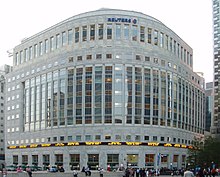Reuters
Reuters (/ˈrɔɪtərz/ (![]() listen) ROY-terz) is a British news agency owned by Thomson Reuters Corporation.[1][2] It employs around 2,500 journalists and 600 photojournalists in about 200 locations worldwide.[3][4] Reuters is one of the largest news agencies in the world.[5][6]
listen) ROY-terz) is a British news agency owned by Thomson Reuters Corporation.[1][2] It employs around 2,500 journalists and 600 photojournalists in about 200 locations worldwide.[3][4] Reuters is one of the largest news agencies in the world.[5][6]
 | |
 Former Reuters building, London | |
| Company type | Independent business |
|---|---|
| Industry | News agency |
| Founded | October 1851 |
| Founder | Paul Julius Reuter |
| Headquarters | City of London, London, England, United Kingdom |
Area served | Worldwide |
Key people |
|
Number of employees | 2500 |
| Parent | Thomson Reuters |
| Website | reuters.com |

The agency was established in London in 1851 by the German-born Paul Reuter. It was bought by the Thomson Corporation of Canada in 2008.[6]
History
change19th century
changePaul Reuter worked at a book-publishing firm in Berlin. He gave out radical pamphlets at the beginning of the Revolutions in 1848. In 1850, Reuter developed a news service in Aachen using homing pigeons and electric telegraphy from 1851 on.[7]
Reuter moved to London in 1851 and established a news wire agency at the London Royal Exchange. Reuter's company covered topics like commercial news, serving banks, brokerage houses, and business firms.[8] Reuter's company started becoming famous for reporting on important topics first many times.[9] For example, it was the first in Europe to report Abraham Lincoln's assassination in 1865.[10][11]
In 1872, Reuter's expanded into the Far East, followed by South America in 1874.[12] In 1878, Reuter retired as managing director. He was replaced by his eldest son, Herbert de Reuter.[13] In 1883, Reuter's began transmitting messages electrically to London newspapers.[12]
20th century
changeReuter's son Herbert de Reuter continued as general manager until his death by suicide in 1915. The company returned to private ownership in 1916 and the company was renamed to "Reuters Limited", removing the apostrophe.[14] In 1925, the Press Association (PA) of Great Britain became very interested in Reuters and some years later got full ownership.[15] In 1945, Reuters was the first broadcasting company to broadcast news of Heinrich Himmler's attempts to negotiate with the western allies through Count Bernadotte, a Swedish nobleman.
References
change- ↑ "Thomson Reuters". Britannica. Archived from the original on 7 November 2018. Retrieved 17 June 2022.
- ↑ "About us". Reuters. Retrieved 14 January 2019.
- ↑ "Home - Reuters News - The Real World in Real Time". Reuters News Agency. Retrieved 13 December 2020.
- ↑ "Careers". www.reuters.tv. Archived from the original on 2 December 2019. Retrieved 14 January 2019.
- ↑ "News agency". Encyclopædia Britannica. 23 August 2002. Retrieved 18 February 2017.
- ↑ 6.0 6.1 Stephen Brook (30 May 2006). "Reuters recruits 100 journalists". The Guardian. Retrieved 5 November 2021.
- ↑ "Reuters (news agency)". Encyclopædia Britannica. 26 March 2010. Retrieved 3 November 2012.
- ↑ "Reuters (news agency)". Encyclopædia Britannica. 26 March 2010. Retrieved 3 November 2012.
- ↑ "Reuters (news agency)". Encyclopædia Britannica. 26 March 2010. Retrieved 3 November 2012.
- ↑ "Reuters (news agency)". Encyclopædia Britannica. 26 March 2010. Retrieved 3 November 2012.
- ↑ Allen, Katie (4 May 2017). "Reuters: a brief history". The Guardian. Archived from the original on 11 October 2017. Retrieved 19 February 2017.
- ↑ 12.0 12.1 Allen, Katie (4 May 2017). "Reuters: a brief history". The Guardian. Archived from the original on 11 October 2017. Retrieved 19 February 2017.
- ↑ "History of Reuters Group PLC". Funding Universe. Retrieved 8 May 2019.
- ↑ "History of Reuters Group PLC". Funding Universe. Retrieved 8 May 2019.
- ↑ "Reuters (news agency)". Encyclopædia Britannica. 26 March 2010. Retrieved 3 November 2012.
Other websites
change- Official website
- Times of Crisis – multimedia interactive charting the year of global change
- Bearing Witness award-winning multimedia reflecting on war in Iraq
- Reuters – The State of the World – News imagery of the 21st century
- Thomson Reuters Foundation Archived 20 November 2010 at the Wayback Machine – philanthropic foundation
- . Encyclopedia Americana. 1920.